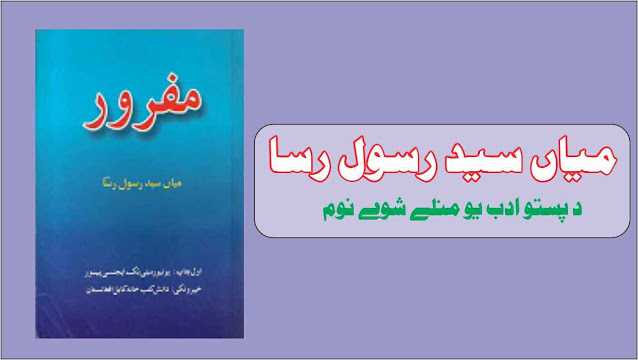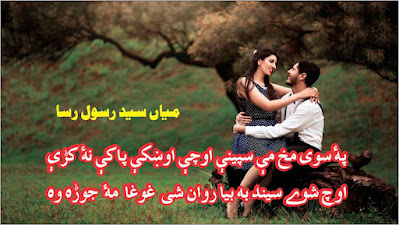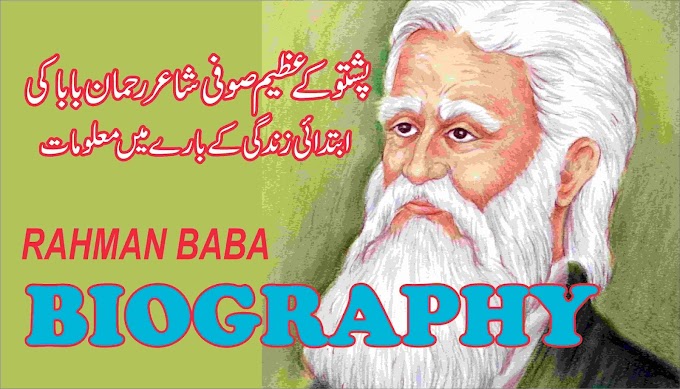Sayed
Rasool Rasa, the famous and authoritative name of Pashto poetry۔
Sayed Rasool Rasa is one of the most famous and authoritative name of Pashto language. They have done a lot for the development of Pashto language.
Syed Rasool Rasa Saib was born on April 10, 1910 in the village of Badrashi in Nowshahr Tehsil. his father's name was Mia Muhammad Saeed and he belonged to Miagan family.Rasa Saib did not complete his primary education at Islamic High School Nowshahr, and went to Islamic College Peshawar for further education. during his studies at the Islamic College, he continued his literary endeavors.
He was also the editor of the Pashto section of the literary magazine of the Islamic College. during his education, Lala Abdul Rahim Niazi, a professor in the Department of Philosophy, dispelled all doubts when he came under the influence of atheism. After passing the BS examination in 1936, Rasa Saib entered Lahore Central College and got a good position in the BT examination from Central College. In 1938, he was employed in the court of education.
After two years of service, he became the editor of "Nan Parun", a Delhi-based magazine. World War II also broke out in those days, and the British opened a branch of Song Publicity at the Radio Court, and appointed Rasa Saib as its director. After that in the Congress Ministry In 1945, he was transferred to All India Radio Delhi.
He came to
Lahore after the partition of India, in 1950 He appointed as a press attaché in
Pakistan embassy in Afghanistan. He held the post for two years, but was later appointed
director of the Tribal Publicity Organization, and held the post until 1953.
Then Sent to Indonesia as Press
Attaché in 1954, in this
capacity, once again to Afghanistan And then sent to Iran. Sayed Rasool Rasa Saib got married in
1953 and from January 1969 to 1970 he was the director of Pashto Academy. He died of a serious illness in 1909, He was
buried in his village cemetery.
Sayyid
Rasool Rasa Saib has rendered innumerable services for the Pashto language, he
added such artists in Pashto literature.
In addition
to their modern styles, eloquence, subtle qualities, and sensations, they are
the epitome of poetic emotion. Allah gave Rasa Saib a poetic conscience,
constructive poetry and a beautiful feeling. These kinds of things are very rare.
Syed Rasool Rasa Saib is a modern poet and he has written many poems in the field of innovation. In Rasa Saib's poetry, if there is a subject and if there is an idea, there is innovation in both Such is the case and if the case is all new, He is aware of the new situation and has tried to solve all these problems in new ways.
There are many beautiful ghazals in Rasa Saib's poetry which
are wonderful ghazals in terms of imagination and elegance.
Here is a sample of his poetry that you will love
غزل
سر دوباره دا هنګامه د وفا مۀ جوړه وه
زما د زړۀ برباده شوي دنيا مۀ جوړه وه
جولۍ پۀ لاس د غم زپلې ځوانې روي درکوم
د سرو ګلونو باغ مې زړۀ کښې اشنا مۀ جوړه وه
سرۀ اننګي د سرو سکروټکو سرې شغلي سا صنم
پۀ سوي زړۀ مې اور به بل کرې خندا مۀ جوړه وه
زرۀ چې برباد شي برباد ښۀ دے بيا اباد چې نۀ شي
تالا ښارونه تالا ښۀ دي تالا مۀ جوړه وه
حنائي لاس پۀ ماتمي جهان کښې خوب د مجنون
پۀ عاشوره د جوند اختر د حنا مۀ جوړه وه
In Syed Rasool Rasa's
poetry many beautiful words and very high metaphors and similes can be found, One
of their most famous poems is "On the bank of Nowshera river".
نظم : د نوښار د سيند پۀ غاړه
زما لاس کښې سرينده وه زۀ ووم ناست د سيند پۀ غاړه
I had a violin in my hand and I was sitting by the
river of nowshera
د نوښار د سيند سما وه د ماښام تياري خورې وي
The view of the Nowshera River was ready for the
evening
زما سترګې پۀ غم سرې وې ما د عشق د غم غزلې
My eyes were red with grief
د اشنا فراق کښې ويلې د اشنا د غم بدلې
Separation of beloved back I said lyrics
د ماښام چپه چپيا کښې زړۀ مې وے راته چې ژاړه
There was silence in the evening and my heart told me
to cry
زما لاس کښې سرينده وه زۀ ووم ناست د سيند پۀ غاړه
I had a violin in my hand and I was sitting by the
river
۔۔۔۔۔۔۔۔۔۔۔۔۔۔۔۔۔۔۔۔۔۔۔۔۔۔۔۔۔۔۔۔۔۔۔۔۔۔۔۔۔۔۔۔۔۔۔۔۔۔۔۔۔۔۔۔۔۔۔۔۔۔۔۔۔۔۔۔۔۔۔۔۔۔۔۔۔۔۔۔۔۔
د يار ياد وو نرے باد وو زما زړۀ کښې شرارې وې
The north wind blew and my heart burned
د نوښار د سيند سما وه د ماښام تيارې خؤرې وې
It was evening, and I was sitting by the river in
Nowshera
پۀ سرو سترګو ژړيدلم زړ مې ډېر وو بې قراره
My eyes were red with tears
څو چپې پۀ سيند کښې راغلي زما خوا کښې تېرېدلې
And the waves of the river passed over me
چورليدلې ، خوريدلې ، ټوليدلې ، ګډېدلې
The waves would seem to dance
رانزدې شوې رانزدې شوې دا ئې اووئيل بې واره
He said as the waves approached me
اے نادانه ولې ژاړې بيا ژړا زما نه لاړه
Why are you crying
د هر چا نه کۀ څۀ غواړې پۀ خندا ئې ترينه غواړه
If you want something from someone, ask for it with a
smile
پۀ ژړا کۀ چا ته سرې کرې دغه تورې سترګې دواړه
No matter how much you cry
لا به وائي درته زور کړه شابه ژاړا ژاړا ژاړا
Nobody cares about your crying
نوټ : دا نظم پۀ خيبر ميګزين کښې چاپ شوے دے
Note: This poem was published in Khyber Magazine












0 Comments
Please do not enter any spam link in the comment box
Emoji